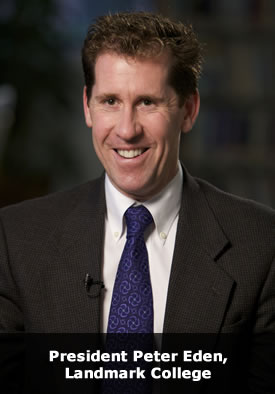Finding Success for College Students Who Learn Differently: The Landmark College Model
By President Peter Eden & Dr. Manju Banerjee
 The traditional brick and mortar model of higher education is rapidly evolving, as online courses, flipped classrooms, and adaptive learning become the norm rather than the exception. At the same time, new understanding of neurodiversity and student learning is redefining best practices in the way we teach and learn. Despite the promise and affordances of technology that make college education a more achievable goal for many students today, challenges abound. Little is known about the online learning environment when considering college students who learn differently. Indeed, research is sparse on whether an online environment supports and scaffolds learning differences or creates additional barriers.
The traditional brick and mortar model of higher education is rapidly evolving, as online courses, flipped classrooms, and adaptive learning become the norm rather than the exception. At the same time, new understanding of neurodiversity and student learning is redefining best practices in the way we teach and learn. Despite the promise and affordances of technology that make college education a more achievable goal for many students today, challenges abound. Little is known about the online learning environment when considering college students who learn differently. Indeed, research is sparse on whether an online environment supports and scaffolds learning differences or creates additional barriers.
Landmark College in Putney, VT, is a private, progressive, and fully accredited college that offers 2- and 4-year degrees for students who learn differently. It is only one of two colleges in the country that exclusively enrolls bright students with documented learning disabilities and difficulties (LD), including dyslexia, Attention Deficit Hyperactivity Disorder and Autism Spectrum Disorder. For almost three decades, teaching and learning at Landmark College has been guided by the paradigm of universal design (UD). UD espouses a movement away from the “deficit model” of needing to remediate, compensate or accommodate learning challenges, to one where the learning environment is actively “designed” to anticipate and scaffold such differences. The focus is not on individual deficits but on the design of the learning space, including pedagogy and a culture of inclusiveness.
This juncture between UD, LD, and online learning is being actively investigated and informed by course offerings and research at Landmark College. Our students with LD have the opportunity to take flipped classes/blended courses and courses delivered through an online adaptive learning platform. Our faculty is continually learning the benefits and challenges these media have to offer for diverse learners. Further, in 2012, Landmark College launched an online/blended five-course certificate program on UD and technology integration for teachers, service providers, and other education professional around the country and Canada. Ultimately, these and related partnerships help students with LD better understand and avail of opportunities in higher education.
We all must better understand that online learning for students with LD carries with it a need to understand the nuances of online learning environment such as synchronous vs. asynchronous delivery, embedded video and other multi-media content, and the value of social presence of the instructor in a virtual environment. There is encouraging news on the horizon. In September, the Committee on Science, Space and Technology in the House of Representatives held it first ever hearing on the Science of Dyslexia. Those called to testify were Dr. Guinevere Eden, Director, Center for the Study of Learning, Georgetown University; Dr. Sally Shaywitz, Co-Director of the Yale Center for Dyslexia and Creativity; a parent of a child with dyslexia; Max Brooks, author and an adult with dyslexia, as well as, Landmark College Office of the President. Furthermore, the National Science Foundation (NSF) has recently awarded a three year $486,970 NSF-REAL grant to researchers at LCIRT, Landmark College’s research institute, to investigate the role of social presence during instructor mediated synchronous versus asynchronous on-line course discussions in statistics for college students with LD.
The modalities in which education (and higher education in particular) is being delivered are clearly being transformed. And all stake holders: students, educators, parents, researchers, and administrators, need to be able to partner to harness the emerging possibilities while avoiding the pitfalls for students who learn differently. The advances and outcomes will benefit all students, as is the case with UD in any educational setting. Research and informed practice is leading the way.#
Dr. Peter Eden is the president of Landmark College in Putney, VT; Dr. Manju Banerjee is Vice-President of Educational Research and Innovation at Landmark College.
